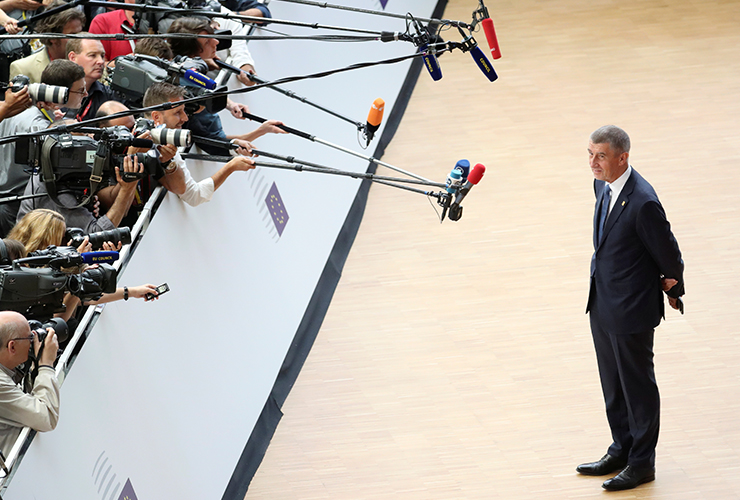Although media freedom is comparatively healthier in the Czech Republic than in other parts of Central Europe, such as Poland and Hungary, the challenges to independent journalism are growing here, too.
Media concentration in the hands of political power, especially Prime Minister Andrej Babiš, who purchased several influential media houses prior to his political ascent, and the proliferation of so-called “alternative media”, are cornering critical journalists.
In addition, smear campaigns and anti-media rhetoric by top officials are on the rise. “The Czech Republic now has a president [Miloš Zeman] who actually jokes about the ‘liquidation’ of journalists”, Eva Hanáková, managing director of SingularityU Czech Summit, commented on a panel discussion at IPI’s 2019 World Congress this June in Geneva.
Quality media outlets and independent journalists find themselves confronted with harassment by online mobs, especially following the publication of stories perceived as critical of populist political leaders.
That is the case for Czech news website HlidaciPes.org (“Watchdog” in Czech). For instance, on September 23, it published an article criticizing what the author considered an excessively friendly interview a journalist hosted with Prime Minister Andrej Babiš on his radio show. The story received an immediate backlash from Babiš supporters and, shortly thereafter, the radio show aired a segment portraying the site and its journalists as traitors and mouthpieces at the service of foreign powers, including Hungarian-born billionaire George Soros.
In Eastern Europe, when journalists or media are linked to “Soros”, it is a “confirmation that you are traitor to your country”, Robert Břešťan, editor-in-chief of HlidaciPes.org, said in an interview with the International Press Institute (IPI). “It also serves as a trigger word to ignite a wave of threats and online abuse”.
He noted: “As the story against us was disseminated through a myriad of propaganda sites, the journalist who authored our article received several abusive messages on Facebook, including death threats against him, his family and his wife.”
Message control
Articles designed to smear HlidaciPes.org label the website as “fake news”, so that “as if by discrediting the messenger, the message is also false”, Břešťan said.
At the same time as independent media face misinformation campaigns, Czech’s populist politicians increasingly address audiences in newly formed outlets that present themselves as news organizations but in practice uncritically transmit the messages of certain politicians.
“TV Barrandov hosts Miloš Zeman for 30 minutes every week unchecked”, Břešťan explained. The website Parlamentnilisty.cz is used by politicians “as a tool to spread hateful comments against refugees or independent media. The website then would use a bombastic quote from the politician’s words as the headline to do clickbait stories”, he added.
The future of disinformation campaigns
“It will become harder and harder for ordinary readers to distinguish what it’s real from what it’s fake and for experience journalists to spot real news as propaganda efforts fine tune their techniques”, Břešťan said when reflecting about what lays ahead for independent journalism in the Czech Republic.
“So this is the real threat for the future, not only for independent quality media but for the future of the society and democracy in Czech Republic and beyond”, he concluded.
[separator style_type=”single” top_margin=”20″ bottom_margin=”20″ sep_color=”#c6c6c6″ border_size=”1,5px” icon=”” icon_circle=”” icon_circle_color=”” width=”” alignment=”center” class=”” id=””]
Since 2014, the International Press Institute (IPI) has been systematically researching online harassment as a new form of silencing critical, independent media. Our work has unveiled patterns of online attacks, analysed the emotional and professional impact on journalists, and collected best practices for newsrooms to address the phenomenon.
MEASURES FOR NEWSROOMS TO ADRESS ONLINE HARASSMENT Explore IPI’s work on online harassment